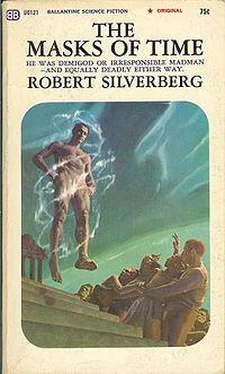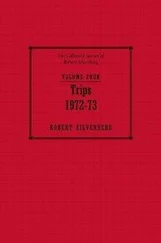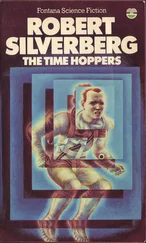Robert Silverberg - The Masks of Time
Здесь есть возможность читать онлайн «Robert Silverberg - The Masks of Time» весь текст электронной книги совершенно бесплатно (целиком полную версию без сокращений). В некоторых случаях можно слушать аудио, скачать через торрент в формате fb2 и присутствует краткое содержание. Год выпуска: 1968, ISBN: 1968, Издательство: Ballantine Books, Жанр: Фантастика и фэнтези, на английском языке. Описание произведения, (предисловие) а так же отзывы посетителей доступны на портале библиотеки ЛибКат.
- Название:The Masks of Time
- Автор:
- Издательство:Ballantine Books
- Жанр:
- Год:1968
- ISBN:0345234464
- Рейтинг книги:3 / 5. Голосов: 1
-
Избранное:Добавить в избранное
- Отзывы:
-
Ваша оценка:
- 60
- 1
- 2
- 3
- 4
- 5
The Masks of Time: краткое содержание, описание и аннотация
Предлагаем к чтению аннотацию, описание, краткое содержание или предисловие (зависит от того, что написал сам автор книги «The Masks of Time»). Если вы не нашли необходимую информацию о книге — напишите в комментариях, мы постараемся отыскать её.
The Masks of Time — читать онлайн бесплатно полную книгу (весь текст) целиком
Ниже представлен текст книги, разбитый по страницам. Система сохранения места последней прочитанной страницы, позволяет с удобством читать онлайн бесплатно книгу «The Masks of Time», без необходимости каждый раз заново искать на чём Вы остановились. Поставьте закладку, и сможете в любой момент перейти на страницу, на которой закончили чтение.
Интервал:
Закладка:
“It didn’t exactly happen that way, Jack. I got drafted to come out here. Vital to national security, that sort of thing. But I just wanted to tell you that as long as I’m here, I’ll try to help you in what you discussed.”
“I’m grateful. Leo.”
“That’s all. Try to relax. Maybe you and Shirley need to get away from the desert for a while.”
“Maybe later on,” he said. “Let’s see how things work out.”
I winked at him and broke the contact. He wasn’t fooling me at all with his feigned cheeriness. Whatever had been boiling and bubbling inside him a few days ago was still there, even though he was trying to apologize it away as foolishness. He needed help.
One more job, now. I opened up the input and started to dictate my position paper on time-reversal. I didn’t know how much copy they wanted, but I figured that it didn’t really matter. I began to talk. A bright dot of green light danced along the ground-glass screen of the computer’s output, typing out my words as I spoke them. Working entirely from memory and not bothering to summon from the data tanks the texts of my own publications, I reeled off a quick, nontechnical prйcis of my thoughts on time-reversal. The gist of it was that while time-reversal on the subatomic level had already been achieved, it did not in terms of any physical theory I understood seem possible for a human being to travel backward in time and arrive at his destination alive, regardless of the power source used to transport him. I bolstered this with a few thoughts on accumulative temporal momentum, the extension of mass into an inverted continuum, and the annihilation of antimatter. And I wound it up by concluding in almost those words that Vornan-19 was plainly a fake.
Then I spent a few moments contemplating my glowing words in the vibrant but temporary green gleam on the screen. I brooded on the fact that the President of the United States, by executive decision, had chosen to look upon Vornan-19’s claims as convincing ones. I pondered the efficacy of telling the President to his face that he was party to a fraud. I debated whether to forfeit my own integrity for the sake of keeping the top man’s conscience from twinging, and then I said to hell with it and told the computer to print what I had dictated and transfer it to the Presidential data files.
A minute later my personal copy bounced out of the output slot, typed, justified on both margins, and neatly stitched. I folded it, put it in my pocket, and called Kralick.
“I’m finished,” I said, “I’d like to get out of here, now.”
He came for me. It was very late afternoon, which is to say it was a bit past midday on the time system my metabolism was accustomed to, and I was hungry. I asked Kralick about lunch. He looked a little puzzled until he realized the time-zone problem. “It’s almost dinnertime for me,” he said. “Look, why don’t we go across the street and have a drink together, and then I’ll show you to your suite in the hotel. Then I can arrange some dinner for you, if that’s all right. An early dinner instead of a late lunch.”
“Good enough,” I told him.
Like Virgil in reverse, he guided me upward out of the maze beneath the White House, and we emerged in the open air at twilight. The city had had a light snowfall while I had been underground, I saw. Melting coils were humming in the sidewalks, and robot sweepers drifted dreamily through the streets, sucking up the slush with their long greedy hoses. A few flakes were still falling. In the shining towers of Washington the lights glittered like jewels against the blue-black afternoon sky. Kralick and I left the White House grounds by a side gate and cut across Pennsylvania Avenue in a knight’s move that brought us into a small, dim cocktail lounge. He folded his long legs under the table with difficulty.
It was one of the automatic places that had been so popular a few years back: a control console at each table, a computerized mixologist in the back room, and an elaborate array of spigots. Kralick asked me what I’d have, and I said filtered rum. He punched it into the console and ordered Scotch and soda for himself. The credit plate lit up; he pushed his card into the slot. An instant later the drinks gurgled from the spigots.
“Drink high,” he said.
“The same.”
I let the rum slip down my gullet. It went down easily, landing on no solid food to speak of, and began to infiltrate my nervous system. Shamelessly I asked for a refill while Kralick was still unwinding himself on his first. He tossed me a thoughtful look, as if telling himself that nothing in my dossier had indicated I was an alcoholic. But he got me the drink.
“Vornan has gone on to Hamburg,” Kralick said abruptly. “He’s studying night life along the Reepersbahn.”
“I thought that was closed down years ago.”
“They run it as a tourist attraction, complete with imitation sailors who come ashore and get into brawls. God knows how he ever heard of it, but you can bet there’ll be a fine brawl there tonight.” He glanced at his watch. “It’s probably going on now. Six hours ahead of us. Tomorrow he’s in Brussels. Then Barcelona for a bullfight. And then New York.”
“God help us.”
“God,” said Kralick, “is bringing the world to an end in eleven months and — what is it? — sixteen days?” He laughed thickly. “Not soon enough. If He’d do the job tomorrow, we wouldn’t have to put up with Vornan-19.”
“Don’t tell me you’re a crypto-Apocalyptist!”
“I’m a cryptoboozer,” he said. “I started on this stuff at lunchtime and my head’s spinning, Garfield. Do you know, I was a lawyer once? Young, bright, ambitious, a decent practice. Why did I want to go into the Government?”
“You ought to punch for an antistim,” I said guardedly.
“You know, you’re right.”
He ordered himself a pill, and then, as an afterthought, ordered a third rum for me. My earlobes felt a little thick. Three drinks in ten minutes? Well, I could always have an antistim too. The pill arrived and Kralick swallowed it; he grimaced as his metabolism went through the speedup that would burn the backlog of alcohol out of it. For a long moment he sat there shivering. Then he pulled himself together.
“Sorry. It hit me all at once.”
“Feel better?”
“Much,” he said. “Did I say anything classified?”
“I doubt it. Except you were wishing the world would end tomorrow.”
“Strictly a mood. Nothing religious about it. Do you mind if I call you Leo?”
“I’d prefer it.”
“Good. Leo, look, I’m sober now, and what I’m saying is the straight orbit. I’ve handed you a lousy job, and I’m sorry about it. If there’s anything I can do to make your life more comfortable while you’re playing nursemaid to this futuristic quack, just ask me. It’s not my money I’ll be spending. I know you like your comforts, and you’ll have them.”
“I appreciate that — ah, Sanford.”
“Sandy.”
“Sandy.”
“For instance, tonight. You came in on short notice, and I don’t suppose you’ve had a chance to contact any friends. Would you like a companion for dinner… and afterward?”
That was thoughtful of him. Ministering to the needs of the aging bachelor scientist. “Thanks,” I said. “but I think I’ll manage by myself tonight. Get caught up with my thoughts, get coordinated to your time-zone—”
“It won’t be any trouble.”
I shrugged the matter aside. We nibbled small algae crackers and listened to the distant hiss of the speakers in the bar’s sound system. Kralick did most of the talking. He mentioned the names of a few of my fellow members of the Vornan committee, among them F. Richard Heyman, the historian, and Helen McIlwain, the anthropologist, and Morton Fields of Chicago, the psychologist. I nodded sagely. I approved.
Читать дальшеИнтервал:
Закладка:
Похожие книги на «The Masks of Time»
Представляем Вашему вниманию похожие книги на «The Masks of Time» списком для выбора. Мы отобрали схожую по названию и смыслу литературу в надежде предоставить читателям больше вариантов отыскать новые, интересные, ещё непрочитанные произведения.
Обсуждение, отзывы о книге «The Masks of Time» и просто собственные мнения читателей. Оставьте ваши комментарии, напишите, что Вы думаете о произведении, его смысле или главных героях. Укажите что конкретно понравилось, а что нет, и почему Вы так считаете.












